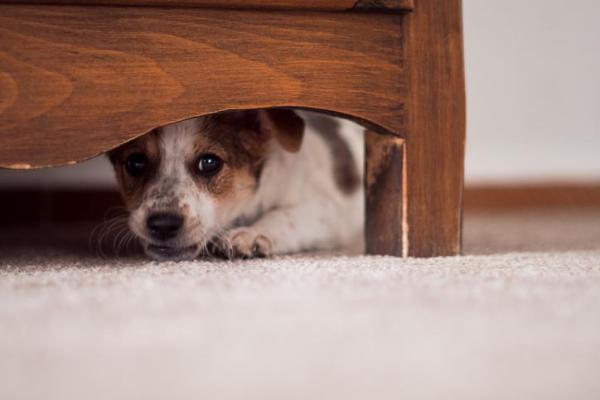
Dog Acting Strange: Causes, Signs, and How to Address the Issue
Dogs are incredible companions known for their loyalty, playfulness, and unconditional love. As a dog owner, it’s concerning when your beloved pet starts behaving strangely. You may notice sudden changes in their behavior, which can be perplexing and worrisome.
In this article, we will explore the various reasons why a dog may act strangely, the signs to watch out for, and steps to address the issue effectively.
- Understanding Normal Dog Behavior
Before diving into strange behavior, it’s essential to understand what constitutes normal dog behavior. Dogs communicate through body language, vocalizations, and behavior, and their actions are often driven by instincts and emotions.
- Identifying Strange Behavior
Spotting unusual behavior in dogs requires keen observation. Different dogs may exhibit varying signs, but some common indications include:
Changes in Appetite and Eating Habits
Dogs that are acting strange may experience a sudden loss of appetite or start eating excessively.
Unusual Aggression or Fear
If a typically friendly dog becomes aggressive or fearful, it might be a sign of an underlying issue.
Excessive Barking or Whining
Unexplained and persistent barking or whining might signal distress or discomfort.
Lethargy and Lack of Energy
A sudden lack of enthusiasm and energy could indicate an underlying health problem.
Hiding or Seeking Excessive Attention
Some dogs may withdraw and hide, while others might seek more attention than usual.
Changes in Bathroom Habits
Inconsistent or unusual bathroom habits may indicate discomfort or illness.
Destructive Behavior
If a well-trained dog starts displaying destructive behavior, it may signify anxiety or stress.
Uncharacteristic Agitation
Restlessness or pacing without apparent reason might be a cause for concern.
Excessive Licking, Scratching, or Chewing
Frequent self-grooming or excessive licking of specific body parts may indicate skin issues or anxiety.
Changes in Sleep Patterns
Unusual sleep disturbances can be a sign of physical discomfort or emotional distress.
Avoiding Certain Places or People
If your dog suddenly avoids specific places or individuals, it might be due to negative associations.
Obsessive Compulsive Behavior
Repetitive actions like tail-chasing or paw licking can be an indication of anxiety.
Changes in Vocalizations
Notice any significant changes in your dog’s barking, whining, or growling patterns.
Unexplained Trembling or Shaking
Trembling or shaking without an apparent reason may signify pain or anxiety.
Hyperactivity
Uncontrolled bursts of energy could be a sign of an issue.
- Common Reasons for Strange Behavior
Now that we’ve explored the signs of strange behavior let’s delve into some common reasons why dogs may act strangely:
Illness or Pain
Dogs may display unusual behavior as a response to pain or discomfort caused by an underlying medical condition.
Environmental Changes
Major life changes such as moving to a new home or the addition of a new family member can cause stress and confusion in dogs.
Fear and Anxiety
Dogs can experience fear and anxiety due to various factors, including loud noises, unfamiliar surroundings, or past traumas.
Lack of Mental and Physical Stimulation
Boredom and lack of mental or physical activity can lead to restlessness and unwanted behavior.
Past Trauma or Abuse
Rescued dogs may exhibit strange behavior due to their past experiences.
- Steps to Address Strange Behavior
If your dog is acting strange, consider taking the following steps to address the issue effectively:
Consult a Veterinarian
A thorough medical examination can rule out any underlying health issues causing the strange behavior.
Maintain a Consistent Routine
Dogs thrive on routine, so ensure you maintain a regular schedule for feeding, exercise, and playtime.
Create a Safe and Calm Environment
Provide a secure and soothing environment to help your dog feel comfortable and reduce anxiety.
Behavior Training
Positive reinforcement training can help modify unwanted behavior and build a stronger bond with your pet.
Offer Mental and Physical Stimulation
Engage your dog in interactive games, puzzles, and regular walks to keep them mentally and physically stimulated.
Conclusion
As a responsible dog owner, it’s essential to be attentive to any sudden changes in your furry friend’s behavior. Dogs act strangely for various reasons, and understanding the signs and potential causes can help you address the issue promptly.
By providing love, care, and attention, you can help your dog navigate through their strange behavior and ensure their overall well-being.
FAQs
Q1: Can stress cause my dog to act strangely?
Yes, stress and anxiety can lead to unusual behavior in dogs. Identifying the source of stress and providing a supportive environment can help alleviate their symptoms.
Q2: Why is my dog suddenly aggressive towards other animals?
Sudden aggression towards other animals can be due to fear, territorial instincts, or past negative experiences. Working with a professional trainer can help address this behavior.
Q3: My dog is excessively chewing on furniture. What should I do?
Excessive chewing can be a sign of boredom or anxiety. Provide appropriate chew toys and ensure your dog gets enough physical and mental exercise.
Q4: How do I know if my dog’s strange behavior is due to a medical issue?
If your dog’s behavior is out of character or persists, consult a veterinarian to rule out any underlying medical conditions.
Q5: Can I use CBD products to calm my dog’s strange behavior?
Consult your veterinarian before using any CBD products for your dog, as they may interact with other medications or have varying effects on individual pets.



